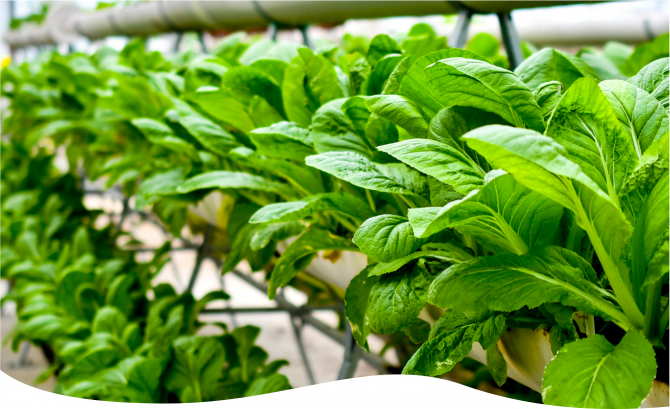Our Solutions
We work with organisations to develop cutting-edge solutions to help solve the UK’s food system problem.
Crops
Climate change will have significant impact on all the conditions affecting crop growth and development through effects on the weather and the soils. Farmers may need to reconsider which cultivars to grow.
Maximising Yeilds
maximising Yeilds
Farmers will be faced with significant challenges to maximize crop yields while managing changing environmental conditions in real time.
Seed Selection
Seed Selection
Climate change will likely result in the need for heartier seeds to withstand changing environment and soil conditions.
Crop Diversification
Crop Diversification
Changing weather and environment and soil fertility will alter crop selections and force farmers to add or subtract crops in the future.
Crop Protection
Crop Protection
Increased use of biopesticides and other forms of Controlled Environment Agriculture will be more extensively employed to counter changes in weather and environment and the threat of new pests associated with Climate Change.
Novel Crops
Novel Crops
Impacts of climate change are already motivating development, experimentation, and innovation into new cultivars. Genetically modified crops, more resilient species, and alternatives such as hemp and seaweed are likely to receive significant consideration.
Crop Rotation
Crop Rotation
Crop rotation is a common practice that has been employed for decades. These techniques will require continued review to maximize their effectiveness in ensuring the maintenance of soil health and fertility.
Hydroculture
Hydroculture
Hydroculture is like hydroponics (growing plants in liquid solution) but instead of using a nutrient solution as a growing medium it uses an inorganic solid medium. Both means are likely to find extensive use in Controlled Environment Agriculture.
Polyculture
Polyculture
Polyculture is the practice of growing more than one crop species in the same space at the same time to reduce the need for pesticides and herbicides and increase soil fertility. Polyculture is returning in popularity in more developed countries as food producers seek to reduce environmental and health concerns.
We're adapting the UK's food agriculture industry to meet net zero targets, and help mitigate the pressures of climate change.
Our Solutions
But It Doesn’t
Stop There…
Climate Spheres UK also assists customers with targeted funding sources to provide financing through grants and other financial resources. We help implement modifications to their processes with speed, efficiency and affordability.
We provide public speaking or workshops for conferences, events and universities, and provide training in a variety of areas related to sustainable agriculture, data interpretation, SME business planning and agro-climatic factors.
Let's restore the biodiversity of our farms and their supply chains.
We are here to guide the sustainable transition that your farm business needs to survive in the changing climate. Together, we can profitably adapt to climate change and UK food abundance and security.
Our Solutions
We work with organisations to develop cutting-edge solutions to help solve the UK’s food system problem.
Crops
Climate change will have significant impact on all the conditions affecting crop growth and development through effects on the weather and the soils. Farmers may need to reconsider which cultivars to grow.
Maximising Yeilds
maximising Yeilds
Farmers will be faced with significant challenges to maximize crop yields while managing changing environmental conditions in real time.
Seed Selection
Seed Selection
Climate change will likely result in the need for heartier seeds to withstand changing environment and soil conditions.
Crop Diversification
Crop Diversification
Changing weather and environment and soil fertility will alter crop selections and force farmers to add or subtract crops in the future.
Crop Protection
Crop Protection
Increased use of biopesticides and other forms of Controlled Environment Agriculture will be more extensively employed to counter changes in weather and environment and the threat of new pests associated with Climate Change.
Novel Crops
Novel Crops
Impacts of climate change are already motivating development, experimentation, and innovation into new cultivars. Genetically modified crops, more resilient species, and alternatives such as hemp and seaweed are likely to receive significant consideration.
Crop Rotation
Crop Rotation
Crop rotation is a common practice that has been employed for decades. These techniques will require continued review to maximize their effectiveness in ensuring the maintenance of soil health and fertility.
Hydroculture
Hydroculture
Hydroculture is like hydroponics (growing plants in liquid solution) but instead of using a nutrient solution as a growing medium it uses an inorganic solid medium. Both means are likely to find extensive use in Controlled Environment Agriculture.
Polyculture
Polyculture
Polyculture is the practice of growing more than one crop species in the same space at the same time to reduce the need for pesticides and herbicides and increase soil fertility. Polyculture is returning in popularity in more developed countries as food producers seek to reduce environmental and health concerns.
We're adapting the UK's food agriculture industry to meet net zero targets, and help mitigate the pressures of climate change.
Our Solutions
But It Doesn't
Stop There...
Climate Spheres UK also assists customers with targeted funding sources to provide financing through grants and other financial resources. We help implement modifications to their processes with speed, efficiency and affordability.
We provide public speaking or workshops for conferences, events and universities, and provide training in a variety of areas related to sustainable agriculture, data interpretation, SME business planning and agro-climatic factors.














